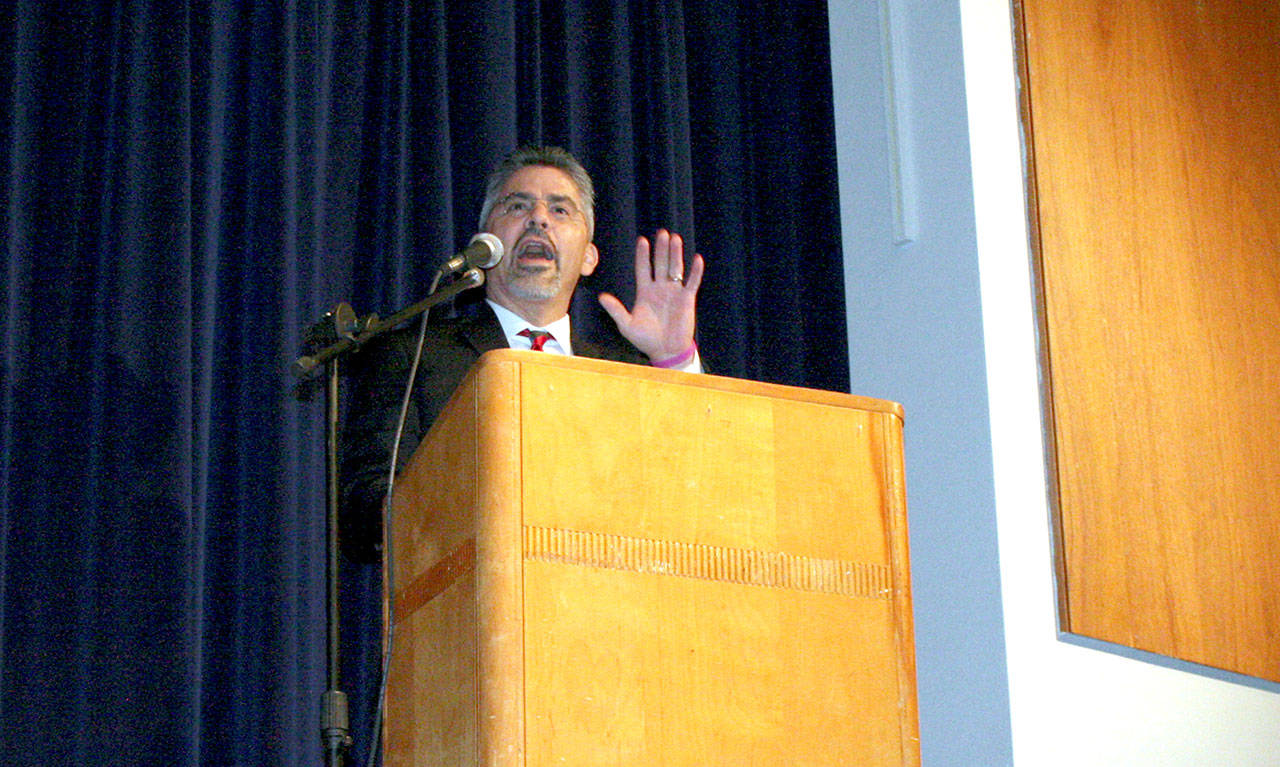CHIMACUM — State Supreme Court Justice Steven Gonzalez stood in front of 200 Chimacum High School students and told them he was an introvert.
“I get nervous when I get in front of crowds,” he said. “I feel more comfortable in the courtroom when I can read the rules.”
Gonzalez provided insight to his time on the bench Monday during his visit to the Chimacum High auditorium. He is in Jefferson County with the other eight justices through today as the Supreme Court hears three cases beginning at 9 a.m. in Jefferson County Superior Court, 1820 Jefferson St., Port Townsend.
For the students, Gonzalez covered his background as the first person in his family to go to college, and he added a little humor about his experience.
Gonzalez, who was appointed to the Supreme Court by Gov. Chris Gregoire in 2012 and has since been elected to a second six-year term, grew up in Claremont, Calif., and he wasn’t impressed with his high school counselor who didn’t provide him a very good path to college.
Between his junior and senior years of high school, Gonzalez took it upon himself to walk into a college admissions office and request an application.
Gonzalez recalled being asked, “Is this for you or for someone else?”
When he replied it was for him, Gonzalez said the woman had another question.
“You realize this is an all-women’s college, right?”
Gonzalez walked out of Scripps College and instead applied at Pitzer College, another school in Claremont.
“I’d learned my lesson,” he said. “The first thing I asked was whether or not it was co-ed.”
As the Chimacum students laughed, Gonzalez admitted misrepresenting his age to get his first job when he was actually 14 instead of 16. He was asked to clean restrooms at public parks.
“I’m not encouraging you to do that, but the statute of limitations has expired on [lying about my age],” he joked.
Gonzalez initially wanted to go to college in order to get a better job, but a funny thing happened when he enrolled at Pitzer: He enjoyed it.
He majored in east Asian studies and spent half of his senior year in China.
He speaks both Japanese and Chinese, and after he took a year off from school, he was offered a two-year scholarship to go to Japan for additional studies.
Gonzalez went to law school at the University of California-Berekley, and he told students he hoped their school counselor provides them with more options on their future path.
“We need you involved in this country’s future,” Gonzalez said. “Our generation, we haven’t figured it all out yet, because if we did, we wouldn’t need you.”
Gonzalez talked about the roles of each of the three branches of government and how the Supreme Court affirms or overturns previous appeals. He stood by the court’s McCleary decision and pointed to the state constitution’s reference to the paramount duty to provide a basic education as “having the strongest language of all states in the nation.”
“This was a case of considerable public importance,” Gonzalez said. “It touches on every taxpayer and child in the state.”
He said it took the state Legislature 6½ years to comply with the ruling, and he expects additional challenges down the road.
“At least they’ve met their own definition for their own benchmarks of amply funding public education,” Gonzalez said of legislators.
Students asked questions that ranged from what Gonzalez considered the most difficult cases — those that involve the death penalty or taking away parental rights to their own children, he said — to what happens when he disagrees with the majority.
“Sometimes I disagree with the outcome, but I feel like it needs to be written that way according to how the law is written,” Gonzalez said.
Out of thousands of cases each year, the state Supreme Court hears about 120, he said.
The justices know how important each one is.
“When we take a case and write an opinion, that becomes precedential,” Gonzalez said. “It becomes common law for the rest of the state.”
________
Jefferson County Managing Editor Brian McLean can be reached at 360-385-2335, ext. 6, or at bmclean@peninsuladailynews.com.

